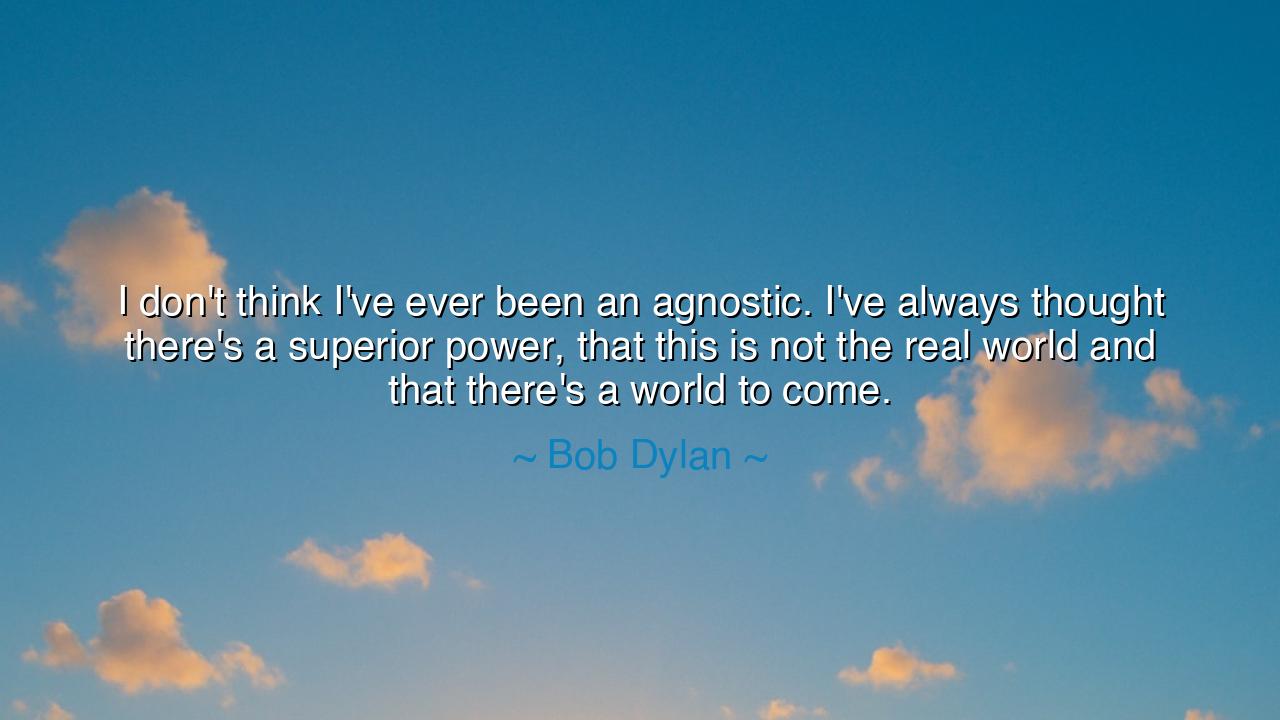
I don't think I've ever been an agnostic. I've always thought
I don't think I've ever been an agnostic. I've always thought there's a superior power, that this is not the real world and that there's a world to come.






Listen, O children of reflection, to the voice of Bob Dylan, who spoke of the unseen realms and the eternal currents that flow beyond the eyes of men. He declared that he has never wandered the path of the agnostic, for in his heart he has always felt the presence of a superior power. This world, he teaches, is not the final truth; it is but a veil, a transient stage before the world to come. Herein lies a teaching for the ages: the soul, attuned to the sacred, discerns a reality far greater than mere sight and touch, and finds guidance in the certainty of the unseen.
The origin of Dylan’s words emerges from his life as a minstrel, poet, and seeker, a man who channeled the spiritual pulse of his age into song and reflection. In the mid-twentieth century, amidst the turbulence of human conflict and social upheaval, he sought meaning beyond politics and culture, turning inward toward the divine. His music, suffused with questions of morality, destiny, and faith, reflects a mind that recognizes a higher order, one that transcends the fleeting concerns of earthly existence.
The meaning of this declaration strikes at the heart of human aspiration. To reject agnosticism is to affirm that life holds purpose beyond mere survival, and that human experience is not confined to what can be measured or explained. There exists, he implies, a realm where justice, beauty, and truth endure beyond the temporal, a world to come that calls for reflection, reverence, and preparation. In this insight, mortals are urged to live with awareness of a grander tapestry, woven by hands greater than their own.
Consider, as history illuminates, the life of John Bunyan, who, imprisoned for his beliefs, envisioned in the darkness of his cell the path to a world beyond, writing The Pilgrim’s Progress. Though confined in body, his spirit journeyed through visions of higher powers and transcendent realities, finding in them guidance, courage, and hope. Dylan, too, channels this ancient impulse: that recognition of a superior power nurtures resilience and imbues life with moral and spiritual significance.
Moreover, Dylan’s reflection teaches that faith is not always loud or doctrinaire; it may dwell quietly within, shaping thoughts, music, and action. The acknowledgment of a world beyond instills humility, patience, and reverence, encouraging men and women to live in harmony with truths greater than themselves. To recognize a superior power is to live with the awareness that the present is a fragment of a larger, eternal story, and that our deeds echo beyond what we see.
Let future generations take heed: life is not confined to the tangible, and wisdom lies in perceiving the divine order beyond the fleeting. As Dylan reminds us, the mortal journey is enriched when guided by the knowledge of a world to come, and when the heart honors a superior power, unseen yet profoundly real. In this understanding, one walks not blindly, but with courage, purpose, and a vision that transcends the passing shadows of the earthly realm.






DHDao Hai
Reading this, I feel a mix of admiration and introspection. Dylan’s clarity about his beliefs highlights the spectrum of spiritual perspectives, from firm faith to agnosticism and atheism. It also raises a practical question: how does belief in a higher power and an afterlife affect daily decision-making, relationships, and creative pursuits? I’m curious whether certainty about another world gives one strength, or if it could also lead to escapism or devaluation of the present life.
NDTran Nguyen Ngoc Diep
This quote provokes curiosity about the relationship between spirituality and artistic expression. If Dylan genuinely believes in a reality beyond this world, does that shape the themes of his music and poetry? I also question how people reconcile such beliefs with empirical reality or scientific understanding. Is faith a framework for making sense of existence, or does it risk detachment from the tangible world? How do individuals balance conviction with critical thinking?
NCTrinh Thi Ngoc Chau
I feel intrigued and somewhat contemplative reading this. It raises questions about the diversity of human belief—how some people feel certain of a higher power while others embrace uncertainty or skepticism. I also wonder whether Dylan’s worldview has evolved over time or remained consistent, and how personal experiences influence such spiritual certainty. Can belief in a world beyond the immediate reality serve as a source of comfort, motivation, or ethical guidance?
DNThuy Duong Nguyen
This statement makes me reflect on the personal nature of belief. Dylan’s conviction in a superior power and an afterlife suggests a deep spiritual perspective, but I wonder how this belief influences his art and worldview. Does holding a firm sense of another world shape creativity, morality, or emotional resilience? I’m also curious whether this perspective resonates with listeners or readers who are skeptical, and how it might inspire conversations about faith and existential purpose.